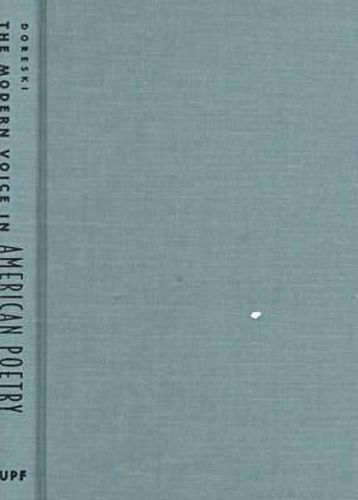Readings Newsletter
Become a Readings Member to make your shopping experience even easier.
Sign in or sign up for free!
You’re not far away from qualifying for FREE standard shipping within Australia
You’ve qualified for FREE standard shipping within Australia
The cart is loading…






A substantial addition to our understanding of how American poets from Frost to Lowell achieved that remarkable range of ‘voice’ that distinguishes modern poetry. It is a pleasure to read. –A. Walton Litz, Holmes Professor of Literature, Princeton University Sophistication, popular critical wisdom has it, is not American. But Doreski makes us see that very sophistication as part of a twentieth-century version of American literary self-assertion. –Times Literary Supplement
Doreski persuasively demonstrates how much poetry has changed since Wordsworth and Browning both in terms of form and also, perhaps more significantly, in terms of address and subject matter… . Offers many specific and detailed examples of how modern American poetry has extended the possibilities of the lyric poem even as it works within an increasingly autobiographical vocabulary. –Harvard Review
Proposing that modern American poetry requires limber criticism informed but not straitjacketed by contemporary theory, William Doreski links the major American modernists to each other and to the larger social and cultural world. Concentrating on such poets as Robert Frost, Wallace Stevens, William Carlos Williams, Marianne Moore, T. S. Eliot, Ezra Pound, and Robert Lowell, he finds that many share a willingness to expand–or even reject–the boundaries of poetic language.
William Doreski is professor of English at Keene State College in New Hampshire. He is the author of The Years of Our Friendship: Robert Lowell and Allen Tate and coauthor of How to Read and Interpret Poetry.
$9.00 standard shipping within Australia
FREE standard shipping within Australia for orders over $100.00
Express & International shipping calculated at checkout
A substantial addition to our understanding of how American poets from Frost to Lowell achieved that remarkable range of ‘voice’ that distinguishes modern poetry. It is a pleasure to read. –A. Walton Litz, Holmes Professor of Literature, Princeton University Sophistication, popular critical wisdom has it, is not American. But Doreski makes us see that very sophistication as part of a twentieth-century version of American literary self-assertion. –Times Literary Supplement
Doreski persuasively demonstrates how much poetry has changed since Wordsworth and Browning both in terms of form and also, perhaps more significantly, in terms of address and subject matter… . Offers many specific and detailed examples of how modern American poetry has extended the possibilities of the lyric poem even as it works within an increasingly autobiographical vocabulary. –Harvard Review
Proposing that modern American poetry requires limber criticism informed but not straitjacketed by contemporary theory, William Doreski links the major American modernists to each other and to the larger social and cultural world. Concentrating on such poets as Robert Frost, Wallace Stevens, William Carlos Williams, Marianne Moore, T. S. Eliot, Ezra Pound, and Robert Lowell, he finds that many share a willingness to expand–or even reject–the boundaries of poetic language.
William Doreski is professor of English at Keene State College in New Hampshire. He is the author of The Years of Our Friendship: Robert Lowell and Allen Tate and coauthor of How to Read and Interpret Poetry.